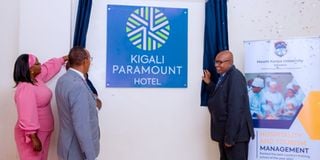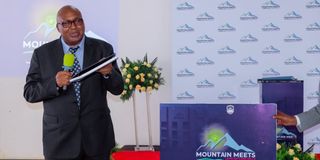Premium
MKU ventures into hospitality industry with new hotel in Kigali

MKU founder and chair Simon Gicharu (right) during the launch of Mount Kenya University Rwanda (MKUR) book on Friday. The book documents the institution's journey and milestone. The event also marked the unveiling of a hotel by MKU to support the institutions hospitality and tourism courses.
Mount Kenya University (MKU) Rwanda is constructing a hotel in Kigali that will support its hospitality and tourism courses and which is inspired by Kenya’s Utalii College.
The hotel’s name was unveiled at a book launch held on Friday at the university’s main campus that was attended by, among others, the university’s founder and chairman, Simon Gicharu. The name for the facility, chosen after a competition, is Kigali Paramount Hotel.
“(It is a) top class training hotel that MKU Rwanda is building to support hospitality and tourism training,” said a statement posted on the university’s website on Saturday.

MKU founder and chair Simon Gicharu (left) during the launch of Mount Kenya University Rwanda (MKUR) book on Friday. The book documents the institution's journey and milestone.
The 40-room hotel is being constructed next to Royal FM, a radio station that MKU Rwanda runs in its headquarters in Kagarama in the outskirts of Kigali.
According to Mr Benson Abuto, who heads MKU Rwanda’s Hospitality and Tourism Department, the hotel aims to imitate Utalii College.
Also Read: Mount Kenya University to build anatomy lab
“I see our department, backed by the hotel, performing a similar role as the Kenya Utalii College: training for the region,” he said.
The university, which started as a technology institute in Thika in 2000, ventured into Rwanda in 2010 and has steadily established its presence in the central African country to be an institution boasting an ultramodern main campus and which attracts thousands of students.
The book launched at the Friday event detailed the journey that the institution has made.
“MKU arrived without much fanfare or marketing blitz. There were no billboards. Neither were there road shows to announce its arrival,” writes Dr Innocent Mugisha, a former executive director at Rwanda’s Higher Education Council, in the book.
In the book, Mr Gicharu describes the inspiration he got from a Rwandese teacher that would later be one of the reasons the university ventured into the country.
“When I was a secondary school student at Gathiruini in Kiambu County, one of my teachers was a well-dressed man from Rwanda called Peter Claver Nyombayire. He taught us biology, a subject that involved the combination of theory and practical lessons. At Gathiruini Secondary, we had no scientific equipment. Mwalimu Nyombayire often fabricated equipment in order to teach us, and when it was not possible, he used humour by asking us to close our eyes and imagine what the practical was about. He never absconded teaching due to lack of equipment,” he states.
“Many years later after I invested in education, I told myself that I would do anything possible to provide my students with all the equipment,” adds Mr Gicharu.
The book further indicates: “Besides the interest in Rwanda sowed into the heart of MKU Rwanda founder Simon Gicharu by a good (Rwandese) teacher, the university’s entry into the country was inspired by inquiries from Rwanda citizens.”
The 178-page coffee table book is titled Mountain Meets Land of 1,000 Hills. It was created by MKU Rwanda’s School of Journalism and Mass Communication.
Speaking during the launch, Mr Gicharu said the book should inspire Africans to document stories of the continent.
“Because of education, we Africans now have a system for reading and writing. Why should we still allow foreigners to come and tell our own story? That is the question we asked ourselves in deciding to write this book. We wanted to tell the story of the establishment of Mount Kenya University Rwanda from the Rwandan perspective,” he said.





